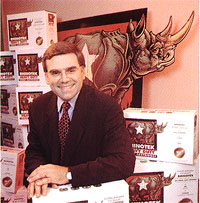Value Creation - Experience - Commitment
Entrepreneur Magazine -- BIZ 101
 WAKE-UP CALL
WAKE-UP CALLBy Bob Weinstein
What goes around:
Inaccurate start-up projections almost pushed Gerald Chamales' computer supply recycling firm into bankruptcy.
As careful as Yonano was in estimating his start-up Costs, entrepreneur Gerald Chamales, 47, was downright careless when it came to estimating how much money he’d need to launch Omni Computer Products, a Carson, California, manufacturer and recycler of computer supplies. Chamales launched the business without a financial plan and evaluated his costs through trial-and-error. “I didn’t have a clue [as to] how much money I’d need,” he says. With a meager $7,000 in savings, in 1980, Chamales leased an office in Santa Monica, California, and started Omni. He rented office furniture and phones, hired two salespeople and contracted with a company to label his products and then drop-ship them to customers - allowing Chamales to start quickly without investing in inventory. But other expenditures crippled Chamales during that first year in business, “I was paying way too much rent,” he says. “Tack on expenses for office equipment and supplies and I burned through the $7,000 in just a few months.” Six months after launching Omni, Chamales found himself running his company out of his apartment in Venice, California. With Just $1,200 left on his credit card, he was forced to rethink his strategies. “When I was down to the proverbial wile, I wised up fast,” says Chamales. “I realized Id better get my financial act together or I wasn’t going to make it.” Fear is a powerful motivator, as Chamales soon learned. “I lived simply and turned every thing I made back into the business,” he explains. He says the whole experience has taught him many lessons, “Before you launch a company, [make sure you] have enough money to cover all your projected expenses for a year,” Chamales advises. As for determining accurate cost estimates, Chamales says a good rule of thumb is to assume everything will cost more than you expect. “My telephone bill, for example, was three times higher than I imagined, and the same went for my travel and gas expenses,’ he says. “Until you’re generating predictable sales, you’d better be prepared with flexible money strategies. After the first six months, Chamales took no financial risks. In fact, he paid himself only $200 a week for five years. When Omni had moved into the black, he relocated the business to a new office and moved into a small studio apartment to lower his living expenses. “I evaluated every expense,” Chamales says. “I was determined to succeed. And he did, far exceeding his expectations. Two years after starting the business, he had 15 salespeople and hefty profits. Today, Omni employs 275 people and boasts sales of nearly $30 million.